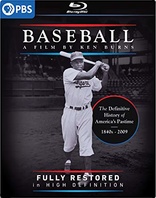剧情介绍
简介:译 名 棒球全史 / 棒球风云
片 名 Baseball
年 代 1994
产 地 美国
类 别 纪录片
语 言 English
上映日期 1994-09-18
豆瓣链接 https://movie.douban.com/subject/1498559/
导 演 肯·伯恩斯 / Ken Burns
演 员 大卫·卡罗素 / David Caruso
Thomas P. 'Tip' O'Neill Thomas P. 'Tip' O'Neill
艾德·哈里斯 / Ed Harris
艾丹·奎因 / Aidan Quinn
Monte Irvin Monte Irvin
Milt Gaston Milt Gaston
M·埃梅特·沃尔什 / M. Emmet Walsh
Willie Morris Willie Morris
John Hartford John Hartford
Charles S. 'Chub' Feeney Charles S. 'Chub' Feeney
朱丽·哈里斯 / Julie Harris
Tom Wicker Tom Wicker
斯蒂芬·金 / Stephen King
Slick Surratt Slick Surratt
Shirley Povich Shirley Povich
Bill Rigney Bill Rigney
Birdie Tebbets Birdie Tebbets
Jesse Jackson Jesse Jackson
Bill Lee Bill Lee
Al Lewis Al Lewis
Marvin Miller Marvin Miller
Jimmie Reese Jimmie Reese
Thomas Boswell Thomas Boswell
Mickey Mantle Mickey Mantle
拉塔尼娅·理查德森 / LaTanya Richardson
汉克·亚伦 / Hank Aaron
约翰·贝拉迪诺 / John Beradino
编 剧 肯·伯恩斯 / Ken Burns
制 片 人 肯·伯恩斯 / Ken Burns
摄 影 肯·伯恩斯 / Ken Burns
简 介
Inning One, Our Game, looks at the origins of baseball in the 1840s and takes the story up to 1900. Burns refutes the myth that Abner Doubleday invented baseball in Cooperstown and traces its roots instead to the earliest days of the nation — there are records of a game called "Base" played at Valley Forge.
Inning Two, Something Like a War, takes viewers through 1910 and introduces some of the game's most celebrated and colorful characters, including Ty Cobb, Honus Wagner, Christy Mathewson and Walter Johnson.
Inning Three, The Faith of Fifty Million People, examines the century's second decade, which was dominated by the Black Sox scandal. George Herman "Babe" Ruth makes his first major league appearance (as a member of the Boston Red Sox) and a wave of immigration helps fill the stands with new fans, eager to "become American" by learning America's game.
Inning Four, A National Heirloom, concentrates on Babe Ruth, whose phenomenal performance thrilled the nation throughout the 1920s and rescued the game from the scandal of the previous decade.
Inning Five, Shadow Ball, tells the story of the Negro Leagues in the 1930s. The title refers to a common pre-game feature in which the players staged a mock game with an imaginary ball. Though unintended, the pantomime was an apt metaphor for the exclusion of blacks from major league play at that time.
Inning Six, The National Pastime, covers the 1940s and includes Joe DiMaggio's celebrated hitting streak, the awe-inspiring performance of Ted Williams and what Burns calls "baseball's finest moment" — the debut of Jackie Robinson, who broke the color barrier as a member of the Brooklyn Dodgers in 1947.
Inning Seven, The Capital of Baseball, takes viewers through the 1950s when New York City had three successful baseball teams and dominated the World Series. By the end of the decade, the Giants and Dodgers had left New York, a signal that the old game was changed forever.
Inning Eight, A Whole New Ball Game, moves the field to the 1960s. This episode traces the emergence of television, the expansion to new cities and the building of anonymous multipurpose stadiums that robbed the game of its intimacy and some of its urban following.
Inning Nine, Home, looks at baseball from the 1970s to the present, including the establishment of the free agent system, the rise in player salaries, the continued expansion, the dilution of talent, the ongoing battles between labor and management and the scandals.
片 名 Baseball
年 代 1994
产 地 美国
类 别 纪录片
语 言 English
上映日期 1994-09-18
豆瓣链接 https://movie.douban.com/subject/1498559/
导 演 肯·伯恩斯 / Ken Burns
演 员 大卫·卡罗素 / David Caruso
Thomas P. 'Tip' O'Neill Thomas P. 'Tip' O'Neill
艾德·哈里斯 / Ed Harris
艾丹·奎因 / Aidan Quinn
Monte Irvin Monte Irvin
Milt Gaston Milt Gaston
M·埃梅特·沃尔什 / M. Emmet Walsh
Willie Morris Willie Morris
John Hartford John Hartford
Charles S. 'Chub' Feeney Charles S. 'Chub' Feeney
朱丽·哈里斯 / Julie Harris
Tom Wicker Tom Wicker
斯蒂芬·金 / Stephen King
Slick Surratt Slick Surratt
Shirley Povich Shirley Povich
Bill Rigney Bill Rigney
Birdie Tebbets Birdie Tebbets
Jesse Jackson Jesse Jackson
Bill Lee Bill Lee
Al Lewis Al Lewis
Marvin Miller Marvin Miller
Jimmie Reese Jimmie Reese
Thomas Boswell Thomas Boswell
Mickey Mantle Mickey Mantle
拉塔尼娅·理查德森 / LaTanya Richardson
汉克·亚伦 / Hank Aaron
约翰·贝拉迪诺 / John Beradino
编 剧 肯·伯恩斯 / Ken Burns
制 片 人 肯·伯恩斯 / Ken Burns
摄 影 肯·伯恩斯 / Ken Burns
简 介
Inning One, Our Game, looks at the origins of baseball in the 1840s and takes the story up to 1900. Burns refutes the myth that Abner Doubleday invented baseball in Cooperstown and traces its roots instead to the earliest days of the nation — there are records of a game called "Base" played at Valley Forge.
Inning Two, Something Like a War, takes viewers through 1910 and introduces some of the game's most celebrated and colorful characters, including Ty Cobb, Honus Wagner, Christy Mathewson and Walter Johnson.
Inning Three, The Faith of Fifty Million People, examines the century's second decade, which was dominated by the Black Sox scandal. George Herman "Babe" Ruth makes his first major league appearance (as a member of the Boston Red Sox) and a wave of immigration helps fill the stands with new fans, eager to "become American" by learning America's game.
Inning Four, A National Heirloom, concentrates on Babe Ruth, whose phenomenal performance thrilled the nation throughout the 1920s and rescued the game from the scandal of the previous decade.
Inning Five, Shadow Ball, tells the story of the Negro Leagues in the 1930s. The title refers to a common pre-game feature in which the players staged a mock game with an imaginary ball. Though unintended, the pantomime was an apt metaphor for the exclusion of blacks from major league play at that time.
Inning Six, The National Pastime, covers the 1940s and includes Joe DiMaggio's celebrated hitting streak, the awe-inspiring performance of Ted Williams and what Burns calls "baseball's finest moment" — the debut of Jackie Robinson, who broke the color barrier as a member of the Brooklyn Dodgers in 1947.
Inning Seven, The Capital of Baseball, takes viewers through the 1950s when New York City had three successful baseball teams and dominated the World Series. By the end of the decade, the Giants and Dodgers had left New York, a signal that the old game was changed forever.
Inning Eight, A Whole New Ball Game, moves the field to the 1960s. This episode traces the emergence of television, the expansion to new cities and the building of anonymous multipurpose stadiums that robbed the game of its intimacy and some of its urban following.
Inning Nine, Home, looks at baseball from the 1970s to the present, including the establishment of the free agent system, the rise in player salaries, the continued expansion, the dilution of talent, the ongoing battles between labor and management and the scandals.
推荐影片
影片评论
共有124条影评本周 • 热播榜
- 0道森市:冰封时光 Dawson City: Frozen Time
- 1IMAX:海湾的飓风 Hurricane on the Bayou
- 2登陆日,诺曼底1944 D-Day: Normandy 1944
- 3看到弗兰肯斯坦哭泣的人 The Man Who Saw Frankenstein Cry
- 4George Michael at the Palais Garnier, Paris
- 5帆船少女号 Maiden
- 6卡拉斯:为爱而声 Maria by Callas
- 7最后一人: 修格·奈特与说唱烈士之死 Last Man Standing: Suge Knight and the Murders of Biggie & Tupac
- 8BBC与乔纳森·丁布尔比同游俄罗斯/俄羅斯深度之旅 Russia: A Journey with Jonathan Dimbleby
- 9IMAX:宇宙之旅 Cosmic Voyage












